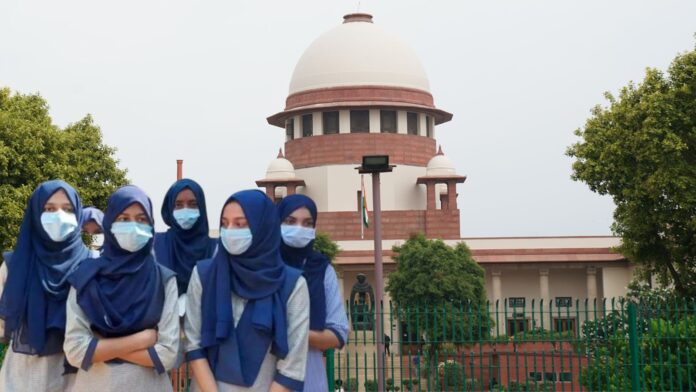Karnataka argued in the Supreme Court that it had the authority to issue an order to educational institutions to follow the discipline of wearing the prescribed school uniforms.
The Supreme Court on September 22 reserved its judgment on a batch of petitions challenging the prohibition on Muslim students from wearing Hijab in classrooms in Karnataka in Fathima Bushra vs the State of Karnataka.
The bench of Justice Hemant Gupta and Justice Sudhanshu Dhulia closed the case after her 10-day hearing filed by the Students’ lawyer and the State.
Previously, a three-judge bench of High Court Justice Ritu Raj Awasthi, Krishna S. Dixit and JM Khazi had held that:
- Hijab is not a part of the essential religious practices of Islam;
- The requirement of uniform is a reasonable restriction on the fundamental right to freedom of expression under Article 19(1)(a):
- The government has the power to pass the case and no case is made out for its invalidation
The students had come to appeal against the Karnataka High Court‘s ruling, which ruled that the hijab ban in classrooms was a reasonable restriction.
The State argued in the apex court that it had the authority to issue an order to educational institutions to follow the discipline of wearing the prescribed school uniforms. The order was religion-neutral and did not distinguish one student from the other.
The appellants before the Supreme Court contended that this was a case of the State failing to provide reasonable accommodation to students exercising their right under Articles 19 and 21.
Solicitor General Tushar Mehta even claimed via social media that the hijab controversy was caused by India’s Popular Front.
Senior Advocate Dushyant Dave from the students’ side argued that their fundamental rights, freedom to choose what to wear, and freedom of religion do not diminish the classroom environment.
Regarding the issue of the Essential Religious Practice Test (ERP ) and whether the hijab is essential to Islam, the appellants argued that the only question to be considered was whether the restriction was considered a valid constitutional restriction. The appellants also expressed that everything in the Quran is mandatory and nothing is a directory. Wearing the hijab was therefore essential to Islam.
The State government argued that the order was “religion-neutral” and did not target any particular community. They argued that the state did not provide justification for restricting the religious freedom of Muslim students.
The appellants claimed that they had not provided a single piece of evidence to support their claims that some students, who wore hijabs in addition to their uniforms in the classroom, violated public order, health and morality.
The appellant’s lawyer claimed that Karnataka had not submitted any documents to support their claim that wearing the hijab violated the fundamental rights of other students. He said the allegations were fairly recent and had not been filed in the High Court. Additionally, the state has not provided any documentation to support its claims.
In the judgement, the Court distinguished between “freedom of conscience” and “religious expression”, arguing that conscience is an internal belief, whereas religious expression is an external expression of that belief. Wearing it is a form of religious expression and must undergo a mandatory religious practice test.
The court ruled that the ban on hijab in educational institutions did not violate the right to freedom of expression under Article 19(1)(a) of the Constitution.
The Court noted a global consensus that uniforms and dress codes can be mandated in educational institutions. Dress codes enacted by state governments are reasonable restrictions, “religiously neutral” and “generally applicable” to all students, and thus do not violate constitutionally protected rights
The court upheld the validity of the order issued by the state government that regulations have been made to facilitate the Karnataka Education Act, 1983. The government had the power to prescribe dress codes under section 133(2) of the Act. This gives the government the power to carry out the purposes of the law by issuing decrees and forming bodies such as University Development Commissions.






